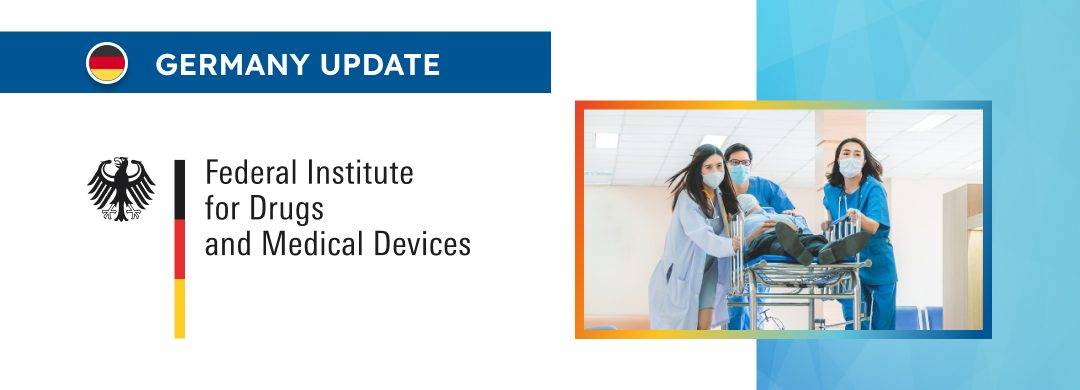The document describes in detail the aspects related to the statement of positive care effect to be included in the submission.

Table of content
The Federal Institute for Drugs and Medical Devices (BfArM), the German national regulating authority in the sphere of healthcare products has published a guidance document dedicated to the submission process related to digital health applications (DiGA) intended for marketing and use in the country.
The document provides an overview of the applicable regulatory requirements, as well as additional clarifications and recommendations to be taken into consideration by medical device manufacturers (software developers) and other parties involved to ensure compliance thereto.
The authority also reserves the right to make changes to the guidance, should such changes be reasonably necessary to reflect corresponding changes to the underlying legislation.
In particular, the document elaborates further on the concept of the positive supply (care) effect described in the previous article, describing the appropriate statements to be included in the submission.
The document provides an overview of the requirements and regulatory framework for demonstrating the positive care effect (pVE) of a DiGA in the healthcare system within the scope of the Digital Health Applications Ordinance (DiGAV).
Identification of the Patient Group
First of all, the authority emphasizes the importance of the precise identification of the patient group that will benefit from the DiGA.
This group is defined by specific medical conditions, categorized under the International Classification of Diseases, Tenth Revision (ICD-10) codes.
Both three- and four-digit ICD-10 codes are used to identify and distinguish the severity and complications of conditions, such as differentiating between all type II diabetics and those with severe complications or poorly controlled diabetes mellitus.
For a DiGA to be prescribable and reimbursable, its pVE must be clearly shown for the defined patient group or groups. In the context of patient care, the ICD-10 codes must be used alongside additional identifiers that indicate diagnostic certainty. These identifiers are critical as they may influence the determination of the target group for the DiGA.

Multiple Indications and Subgroup Analyses
According to the guidance, manufacturers have the option to assign multiple indications for a single DiGA.
However, they must provide separate evidence of pVE for each patient group defined by distinct ICD-10 codes. There exists the possibility of combined evidence for multiple indications if the related pVEs are essentially comparable, which might be more efficient in some cases. When the range of applicable indications is wide, the studied group must represent it.
All justifications for such decisions are subject to the evaluation and approval of the BfArM.
Improving Transparency in Predicate Device Selection
The document also highlights the commitment of the authority to improve the transparency of the predicate device selection process through the 510(k) Summary.
This document serves as a concise report detailing the safety and effectiveness of the device and is a critical part of the 510(k) submission.
It is required to be detailed enough to provide an understanding of the rationale behind the FDA determination of substantial equivalence.
The FDA has outlined what the 510(k) Summary must contain and the level of detail required. Submitters are expected to draft this summary with an explanation of how they selected the predicate device(s), ensuring that the selection aligns with the FDA’s best practices.
This approach serves to improve the predictability of the 510(k) process and to ensure that the public has access to clear information regarding how decisions are made.
In instances where a valid predicate device that complies with all the best practices is not available, the FDA requires the submitter to explicitly state this in the 510(k) Summary.
Additionally, the submitters are expected to describe the performance testing conducted to mitigate any known safety or effectiveness issues with the chosen predicate device.
This is a step towards ensuring that even in the absence of an ideal predicate, the new device has been rigorously evaluated to address any potential concerns.
Evolution of Nomenclature
The authority acknowledges the potential for future developments in the application process for DiGAs, including the inclusion of other nomenclature systems such as SNOMED CT or identifiers specific to rare diseases such as Alpha-ID-SE due to the dynamic nature of the digital health field and its regulatory landscape.
Consistency with Intended Medical Purpose
The guidance also outlines the importance of consistency between the DiGA’s intended medical purpose and the pVEs.
For instance, if a DiGA intended for treating knee osteoarthritis is applied to wrist osteoarthritis, it would be deemed inconsistent with its declared purpose.
However, a DiGA intended for treating headache disorders could be legitimately used for tension headaches specifically, as this falls within the broader category of its intended use.
Evidence Through Endpoints and Exclusion of Economic Factors
The evidence of pVE must be reliable, demonstrated through study endpoints that clearly show patient benefits.
These benefits must be direct and significant for the insured patients, not theoretical or abstract. The document states that economic factors do not influence the assessment for inclusion in the DiGA directory, though they may be considered during subsequent price negotiations.
Non-exhaustive List of Positive Effects
Finally, the DiGAV indicates that the list of positive effects that a DiGA might demonstrate is not exhaustive.
The phrase “in particular” suggests that while there are significant examples provided, this list can be expanded.
Manufacturers are encouraged to present additional aspects of pVE that align with the medical purpose of the DiGA and are substantiated by scientifically recognized standards and methods.
Conclusion
In summary, the present BfArM guidance describes the approach to be followed by medical device manufacturers (software developers) to the statements they make when placing their products on the market.
The document outlines the key considerations associated with making references to a specific patient group and also highlights specific aspects related to the indications for use and the way they should be described.
How Can RegDesk Help?
RegDesk is an AI-powered Regulatory Information Management System (RIMS) designed to simplify global compliance for medical device companies. With regulatory intelligence covering 120+ markets, RegDesk helps you prepare and publish global submissions, manage standards, conduct impact assessments, and stay ahead of regulatory changes all from a single, centralized platform. Expanding into new markets has never been easier.

